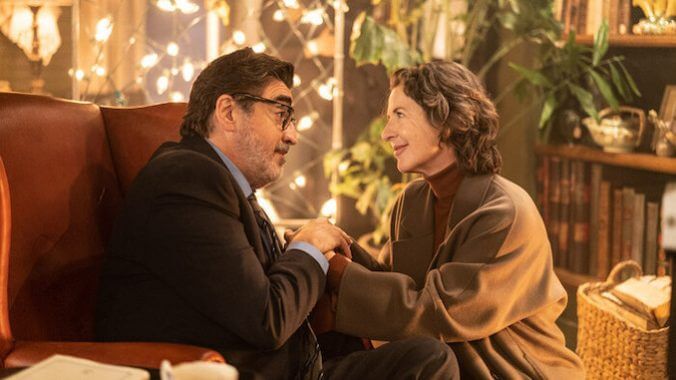Prime Video’s Poorly Conceived Detective Drama Three Pines Is Not Worth Investigating
Photo Courtesy of Amazon Prime Video
How many detective novel series are there, really? Hundreds? Thousands? Are there infinite men in coats skulking around crime scenes; do there exist unlimited pairs of world-wearied eyes that see things others can’t; are there boundless cohorts of the same colleagues who rotate between them four or five shared character traits and backstories? Are these detectives all meant to be ill-defined and same-ish, with vague suggestions at psychological issues and personality disorders, so any cultural and sociological landscape can be imprinted on them to suggest that this character, these stories, are unique and independent from the deluge of others? And when these books are adapted to television with recognizable character actors or up-and-coming stars, are we really to believe they’re all beloved best-sellers; or is what’s put on television just the tip of the iceberg of an intimidatingly expanse of literature that promises to be even more stale?
Enter Inspector Armand Gamache (Alfred Molina), who finds himself in the sleepy, charming Quebecois village of Three Pines to solve a perplexing mystery that soon unfolds into another, and another, until crime and secrecy has eventually stained every member of the populace. Throughout this, the legacy of violence against Indigenous Canadians—and especially law enforcement’s failure to bring its perpetrators to justice—threads through the story, changing up Three Pines’ structure and attempting to sow psychological distress into the main detective character. There’s nothing flat-out appalling about Three Pines, but its structural peculiarities and thinly spread characters render a lot of its mystery and intrigue inert. Its main problem is even more simple: it is nigh-impossible to care about a show you’ve seen millions of times before.
There’s a tonal problem in Prime Video’s Three Pines, even if it’s unclear how intentional its disparate tones are meant to be. On the one hand, Gamache’s guilt over failing to right the police force’s institutional wrongs of protecting Indigenous people is a resonant and often stirring throughline for the show—even if his colleague Lacoste (Elle-Máijá Tailfeathers) does most of the heavy lifting in a plot strand that interrogates the emotional toll of missing persons on their Indigenous relatives. On the other hand, most of the murders that unfold in Three Pines are completely ludicrous, diverting from reality so distinctly that you wonder if they’re meant to be considered high camp. Look, I’m the first to say that more tense build-ups to death-by-electrocution at curling matches should feel like they’re lifted from a Brian De Palma movie, but not if we’re meant to empathize with unprocessed grief in the next scene.
The tonal problem is, like many things in Three Pines, a symptom of some bizarre structural choices. Last month’s The Calling wisely divided its eight episodes into two mystery arcs; Three Pines went even further with four, two-episode arcs (all eight episodes of which were screened for review). It satisfies that deep Law & Order hunger we all secretly harbor for good two-parters, and helps give us a broader, more naturally sketched look at our setting. Potential suspects are able to interact with people other than cops, and each crime feels connected to the general distress and malaise that’s spreading through the village. But there’s a realism problem: by the third and fourth storyline, you start to feel like everyone should be commenting on the sheer implausibility of the frequency of violent crimes (especially ones as silly as these), and attempts to weave a missing person investigation through all of them feel undercooked.